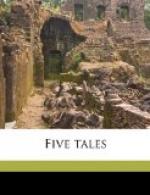“Oh! Just let me go in, I won’t wake him unless he does. But I do want to show him my dress.”
The girl moved aside; and on tiptoe Phyllis passed in. She walked to where, between the lamp-glow and the fire-glow, she was lighted up. White satin—her first low-cut dress—the flush of her first supper party—a gardenia at her breast, another in her fingers! Oh! what a pity he was asleep! How red he looked! How funnily old men breathed! And mysteriously, as a child might, she whispered:
“Guardy!”
No answer! And pouting, she stood twiddling the gardenia. Then suddenly she thought: ’I’ll put it in his buttonhole! When he wakes up and sees it, how he’ll jump!’
And stealing close, she bent and slipped it in. Two faces looked at her from round the door; she heard Bob Pillin’s smothered chuckle; her mother’s rich and feathery laugh. Oh! How red his forehead was! She touched it with her lips; skipped back, twirled round, danced silently a second, blew a kiss, and like quicksilver was gone.
And the whispering, the chuckling, and one little out-pealing laugh rose in the hall.
But the old man slept. Nor until Meller came at his usual hour of half-past twelve, was it known that he would never wake.
THE APPLE TREE
“The
Apple-tree, the singing and the gold.”
Murray’s
“Hippolytus of Euripides.”
In their silver-wedding day Ashurst and his wife were motoring along the outskirts of the moor, intending to crown the festival by stopping the night at Torquay, where they had first met. This was the idea of Stella Ashurst, whose character contained a streak of sentiment. If she had long lost the blue-eyed, flower-like charm, the cool slim purity of face and form, the apple-blossom colouring, which had so swiftly and so oddly affected Ashurst twenty-six years ago, she was still at forty-three a comely and faithful companion, whose cheeks were faintly mottled, and whose grey-blue eyes had acquired a certain fullness.
It was she who had stopped the car where the common rose steeply to the left, and a narrow strip of larch and beech, with here and there a pine, stretched out towards the valley between the road and the first long high hill of the full moor. She was looking for a place where they might lunch, for Ashurst never looked for anything; and this, between the golden furze and the feathery green larches smelling of lemons in the last sun of April—this, with a view into the deep valley and up to the long moor heights, seemed fitting to the decisive nature of one who sketched in water-colours, and loved romantic spots. Grasping her paint box, she got out.
“Won’t this do, Frank?”
Ashurst, rather like a bearded Schiller, grey in the wings, tall, long-legged, with large remote grey eyes which sometimes filled with meaning and became almost beautiful, with nose a little to one side, and bearded lips just open—Ashurst, forty-eight, and silent, grasped the luncheon basket, and got out too.




